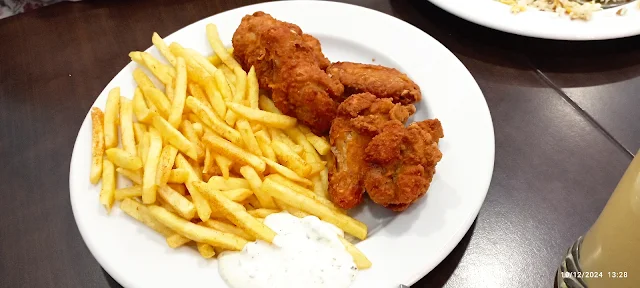Porto, Portugal
Maus Hábitos – This restaurant serves a variety of dishes, including halal options.
Muzu - Modern Sushi – Offers halal-certified sushi dishes.
Tavi Confeitaria – A pastry shop with some halal-friendly options.
Madrid, Spain
Alzahra – A well-known halal restaurant serving Middle Eastern cuisine.
Raja Mahal – A popular Indian and Pakistani restaurant offering halal food.
Asador de Aranda – Specializes in halal-certified grilled meats.
Berlin, Germany
Hasir Kreuzberg – Famous for its Turkish halal kebabs.
Burger Zone – Offers halal-certified burgers.
Café Rissani – Serves Moroccan-style halal food.
Tokyo, Japan
Gyumon – A halal-friendly Yakiniku (Japanese BBQ) restaurant.
Sekai Café – Offers a range of halal dishes and is popular with tourists.
Naritaya Halal Ramen – Famous for its halal ramen.
Paris, France
Le Wok Saint Germain – Serves halal Asian fusion cuisine.
Les Enfants Terribles – Offers halal-friendly French cuisine.
Chez Michel – A popular spot for halal French dishes.
New York, USA
The Halal Guys – Famous for its halal street food, especially gyros and falafel.
Kashmir 9 – A restaurant serving halal Indian and Pakistani dishes.
Sahara East – Offers Middle Eastern halal dishes.
London, UK
Dishoom – A trendy Indian restaurant offering halal meat options.
Meat & Shake – A burger joint with a fully halal menu.
Hankies Café – Offers halal-friendly Indian street food.
Can Halal Food Be Vegetarian or Vegan?
Yes, vegetarian and vegan foods are typically considered halal, as long as they don’t contain alcohol, intoxicants, or any other forbidden (haram) substances.
Since these foods naturally exclude meat, pork, and animal by-products, they align with halal guidelines.
However, to be strictly halal, attention must still be paid to cross-contamination and the presence of any alcohol-based ingredients (such as in cooking or sauces).
For example, certain additives, flavorings, or preservatives used in processed vegetarian or vegan foods may contain haram ingredients, so it’s important to verify the ingredients list or ask for halal certification.
Suggestions and Tips for Eating Halal Food
Check for Certification: Many halal restaurants will display a halal certification on their premises or website.
Ask About Preparation: If you’re in a non-halal restaurant, ask if the kitchen can prepare your meal without haram ingredients or contamination.
Download Halal Apps: There are several apps, like "Zabihah," "HalalTrip," or "HappyCow" (for vegetarian/vegan halal options), which help you find halal-certified restaurants nearby.
Avoid Alcohol-Based Sauces: Be cautious of sauces or dishes cooked with alcohol, as these are not halal.
Even vegetarian dishes with alcohol-based cooking wine or sauces would not be considered permissible.
Be Open to Diverse Cuisine: Halal food is not limited to Middle Eastern or South Asian cuisine.
Many restaurants in Europe, Asia, and North America offer halal options across various cuisines, such as Japanese, French, or even fast food.
Check Grocery Products: If cooking at home, check for halal certification on food labels when shopping for meat or processed foods.
Halal-certified products are increasingly available in major supermarkets.
Be Aware of Local Customs: In some non-Muslim-majority countries, halal food options may be more limited, so research in advance.
Q1: Can non-Muslims eat halal food?
A1: Yes, halal food is not restricted to Muslims. Anyone can eat it.
Q2: Is halal food healthier?
A2: While halal food itself is not necessarily healthier, the ethical standards for meat preparation may appeal to people looking for humane animal treatment.
Q3: Can halal food be served in non-Muslim countries?
A3: Yes, halal food is widely available in non-Muslim-majority countries, particularly in diverse cities like London, New York, and Paris.
Q4: Is there halal certification?
A4: Yes, many countries have halal certification authorities that inspect and certify halal food products and restaurants.
Q5: Can halal food be vegetarian?
A5: Yes, vegetarian and vegan foods are typically considered halal as long as they don’t contain alcohol or other forbidden substances.
Q6: Can non-Muslims prepare halal food?
A6: Yes, non-Muslims can prepare halal food as long as they adhere to the proper guidelines of halal food preparation.
There is no restriction on who can cook or serve halal food, as long as the rules are followed.
Q7: Is kosher food the same as halal?
A7: Kosher food and halal food have some similarities, particularly in the slaughtering of animals, but they are not the same.
The rules for kosher food come from Jewish dietary laws and differ in some aspects, such as the allowance of alcohol in kosher foods, which is not allowed in halal.
Q8: How do I verify if a restaurant is truly halal?
A8: Restaurants often display halal certification issued by trusted Islamic authorities.
You can also ask staff about their halal practices, or check reviews from other Muslim diners.
Q9: Can halal food be served at non-Muslim events?
A8: Yes, halal food can be served at any event, regardless of religious affiliation.
Many people choose halal food because of the ethical standards it follows or to cater to Muslim guests.
Q10: Is organic food automatically halal?
A10: No, organic food is not automatically halal.
While organic food may meet higher standards of natural farming, it still must follow halal guidelines, especially concerning animal slaughter and the exclusion of haram ingredients.
With this understanding, you’ll have a better grasp of halal food practices, how it’s prepared, and where to find it in major cities.
Whether you are Muslim or just someone interested in ethical and clean eating, halal food offers a range of options, from traditional Middle Eastern dishes to modern cuisine around the world.
The Halal food which we have taken in lunch in Porto Portugal:
Booking.com
Save big on your next flight with Skyscanner.
Easily find the best options for your trip.
Get the best deals with just a few clicks.
Search flights, hotels, and car rentals to popular destinations.
Grab the Best Deals on Flights, Hotels, and Cars
Compare Now



















Comments
Post a Comment